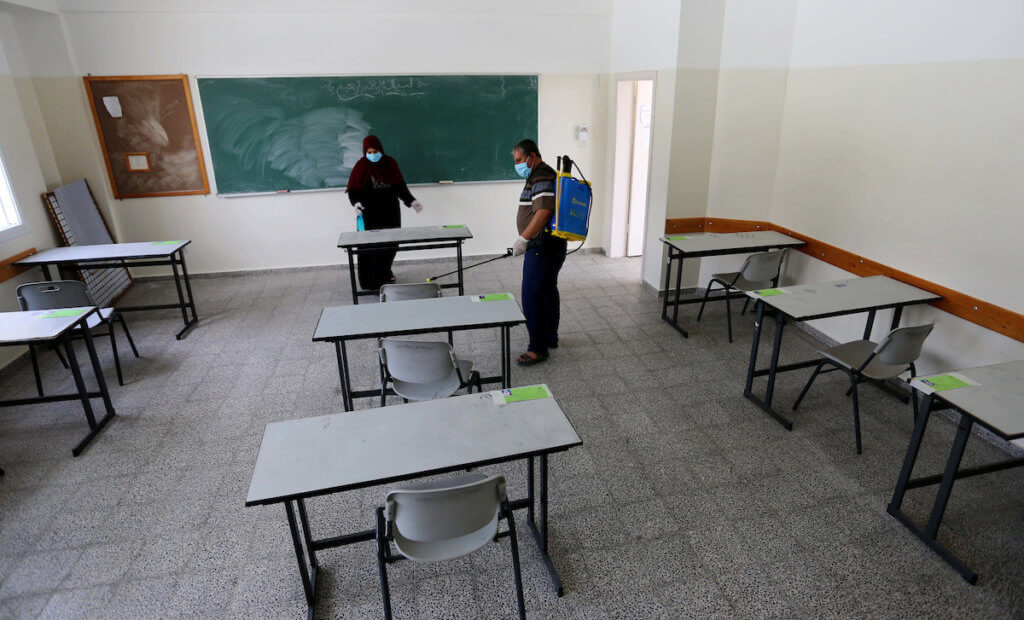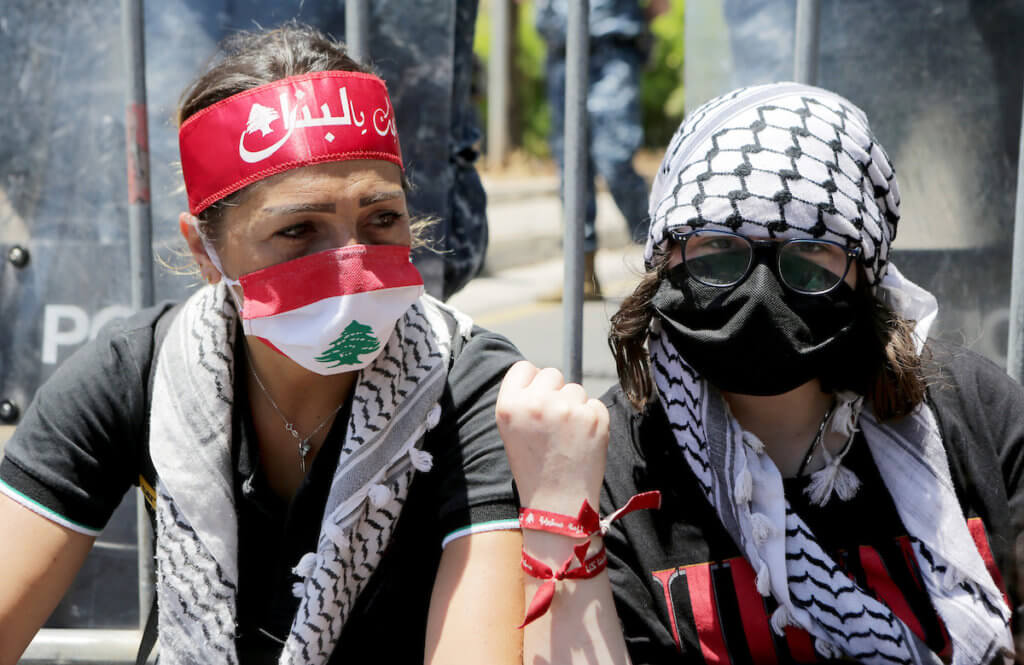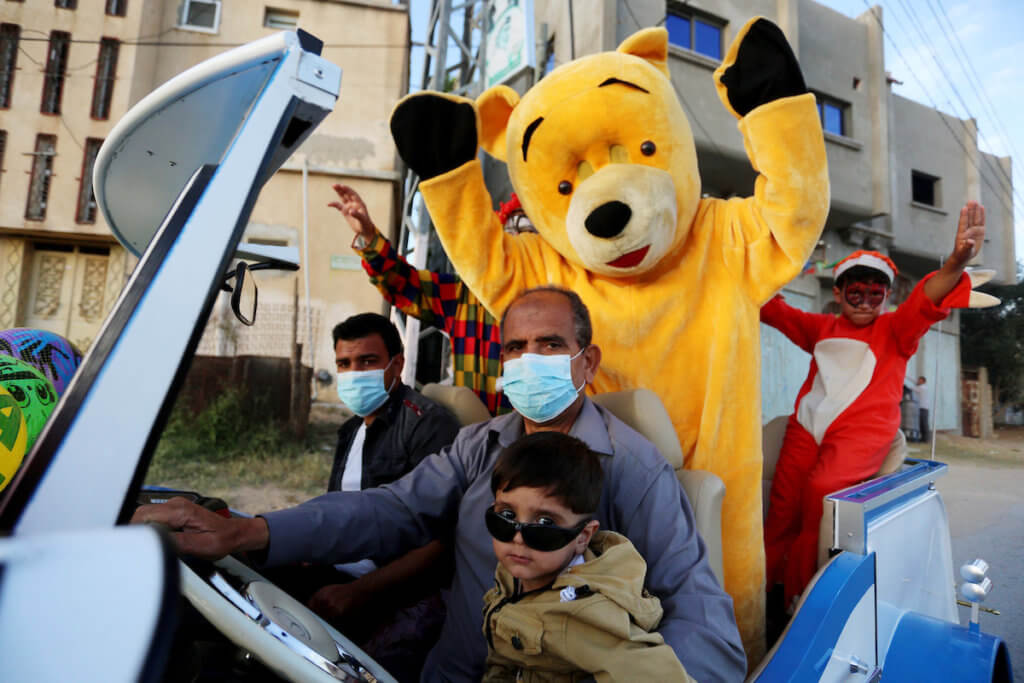Highlights:
- 385 confirmed cases of COVID-19 in the West Bank; 179 in Jerusalem; and 61 in Gaza
- 5 Palestinians have died of COVID-19 related causes; 2 in Jerusalem; 2 in the West Bank; 2 in Gaza
- 16,809 tested positive for COVID-19 in Israel
- 1,909 active cases remain in Israel; 36 are on ventilators; 284 have died
As new cases of the coronavirus continue to slow, this week Palestinian officials in the West Bank officially ended the state of emergency. Closures of restaurants, gyms, shops and offices were scaled back, although social distancing measures inside of businesses and wearing masks in public are expected to continue.
Mondoweiss’ Yumna Patel reported even though the end of lockdown was announced this past Tuesday, there was a steady and soft reopening of the economy over the last month which coincided with Ramadan, the Muslim holy month in Islam that is typically a bustling holiday season.
One taxi driver in Bethlehem told her, “Practically everything was opened up during Ramadan.”
“So why would they expect people to suddenly go back under lockdown after spending a month out and about?” he mused.
What’s more, Patel reported the road to ending the lockdown has been rocky. Over the Eid holiday last weekend clashes took place between Palestinians who wanted an end to the lockdown and police. She reports:
“Shop owners in Bethlehem clashed with police officers who attempted to enforce the government’s closure, causing a scuffle that resulted in officers shooting two civilians in the legs.
The ensuing confrontations forced police across the city to abandon their posts, for fear that their presence could spark more violent clashes.
Similar incidents took place in the cities of Hebron and Tulkarem, as people clashed with local forces over the closure of shops and mosques, with some people breaking open the padlocks on the doors of mosques and flooding the places of worship for Eid morning prayers.”

First death in Gaza
Heath officials announced over the weekend the first Palestinian fatality in Gaza due to COVID-19. They identified the casualty on Saturday as a 77-year-old woman who had a pre-existing condition. The woman, whose name was withheld from reporters, entered the Gaza Strip from Egypt on May 19 and went directly to a government-run isolation center where she was tested.
While the West Bank seems to have flattened the curve, in the Gaza Strip, it’s less clear if Palestinians are reaching a turning point. As far as health officials know, there is no community spread in Gaza. The only confirmed cases of COVID-19 have been found in the government quarantine centers for returning travelers. Of course, there is speculation that the coronavirus could be stealthy circulating inside Gaza undetected, because the only tests that have been administered are to those in the quarantine centers. It’s a conundrum for health officials.
Although testing has ramped up in recent weeks there are still not enough COVID-19 tests available in Gaza for everyone in a government isolation center. There are 15 isolation centers, mostly hotels.
They house a total of 1,493 Palestinians as of Wednesday, who are cared for by a total of 33 medical staff and 100 police. The number includes the 42 active cases of COVID-19 in Gaza, all of whom are being treated in isolation room at the al-Maydani Hospital.
The Ministry of Health in Gaza outlined their quarantine procedures in an update to reporters this week, clarifying isolation is supposed to last 21 days, with testing administered on the fourth and 20th day of quarantine. However, when no tests are available, quarantine is extended to 28 days.
A total of 9,328 samples have been tested in Gaza.
Most cases of the coronavirus in Israel came from the U.S.
Last week Dr. Adi Stern of the School of Molecular Cell Biology and Biotechnology at Tel Aviv University’s George S. Wise Faculty of Life Sciences and a team of researchers found 70 percent of the coronavirus cases in Israel could be traced back to the U.S. The study conducted genomic sequencing of the virus, mapping mutations that allowed them to trace the spread.
“We can look at these mutations as a kind of barcode that helps us keep track of the progression and transformation of the coronavirus as it moves from country to country,” Stern said.
The study was published days before Israel ended most of its lockdown. Beginning on Tuesday, after a week of nominal increases in cases, businesses, schools and event halls reopened, albeit with social distancing guidelines. Two days into relaxed restrictions, Israel experienced a spike of new cases, 79 testing positive for COVID-19, the largest single-day increase in weeks.

‘Nothing to wash our hands with’
This week the Israeli human rights group B’Tselem reported Palestinians living in the northern West Bank village of Kafr Qadum are facing added sanitation challenges, Israeli soldiers are shooting their water tanks during demonstrations.
B’Tselem reports:
“In recent weeks, soldiers have repeatedly shot holes in water tanks on the roofs of homes in Kafr Qadum. The shooting takes place during the weekly protests against the closure of the eastern exit from the village, which connects the village to the city of Nablus and passes through the expansion of the settlement of Kedumim. The residents have been holding the weekly protests since 2011.”
Yumna Patel covered the impact of the loss of the water tanks for Mondoweiss, reporting:
“‘Now, because of the coronavirus, we have to be especially careful about cleanliness,’ Assem Aqel, whose family lost more than 450 liters of water one day, said in a testimony to B’Tselem.
‘We have to shower, wash our clothes and wash our hands more often. It’s also the water we use for cooking and drinking. I don’t understand how the soldiers can be so heartless and damage water tanks like that. Water is the main source of life for every human being,’ he said.”

Palestinians in Lebanon are without cash
We’re following a story out of Lebanon where Palestinian refugees were already in the midsts of a economic crisis when the coronavirus pandemic hit the region. Last week, chaos broke out when refugees waiting in long lines for hours for cash at a UN center only to find the money had not arrived.
Abby Sewell and Kareem Chehayeb covered the story for the New Humanitarian. They report:
“‘For a week, we’ve been coming and going for nothing, and standing in the sun,’ said 82-year old Fawad Yusef, a Palestinian refugee who left self-isolation at home to join the end of a line of dozens of people outside a Beirut money transfer office on Friday afternoon. He had first queued in an even larger crowd to take a transaction number at a nearby school set up as a staging area. ‘Now, we’ve been here for an hour and maybe there’s nothing,’ Yusef said.”


